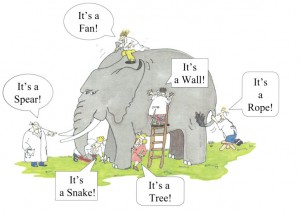 There is a lot of talk in the sector at present about the benefits of interdisciplinary research. But what exactly does this mean? The best definition I have found is from a report by The National Academies (2004) – “Interdisciplinary research is a mode of research by teams or individuals that integrates information, data, techniques, tools, perspectives, concepts, and/or theories from two or more disciplines or bodies of specialized knowledge to advance fundamental understanding or to solve problems whose solutions are beyond the scope of a single discipline or area of research practice.” (download the full report for free here).
There is a lot of talk in the sector at present about the benefits of interdisciplinary research. But what exactly does this mean? The best definition I have found is from a report by The National Academies (2004) – “Interdisciplinary research is a mode of research by teams or individuals that integrates information, data, techniques, tools, perspectives, concepts, and/or theories from two or more disciplines or bodies of specialized knowledge to advance fundamental understanding or to solve problems whose solutions are beyond the scope of a single discipline or area of research practice.” (download the full report for free here).
At the HEFCE REFlections event last month there was a lot of talk about interdisciplinary research. Apparently most of the high-scoring impact case studies and outputs submitted to REF 2014 featured interdisciplinary research, and HEFCE are considering making interdisciplinary research a feature of the next REF assessment in which it could carry additional marks. They have commissioned Elsevier to conduct a review of interdisciplinary research with a view to the data feeding into the review of the REF and informing future exercises (read the sides here).
 This seems a surprising turn of events, considering REF 2014 took so much flack in the months and years leading up to submission from academics who feared it would disadvantage interdisciplinary research. Ismael Rafols (University of Sussex), for example, claimed there is a systematic bias against interdisciplinarity in journal rankings, with the top-ranking journals covering a few specialist disciplines (read the full article here). In the run up to the REF submission there was concern that it wasn’t REF that was disadvantaging interdisciplinary research but institutions that were choosing not to submit it due to it being ‘too risky’ (see this article in The Guardian). But later articles started to look at how the REF actually benefited interdisciplinary researchers (for example, see this article in The Guardian).
This seems a surprising turn of events, considering REF 2014 took so much flack in the months and years leading up to submission from academics who feared it would disadvantage interdisciplinary research. Ismael Rafols (University of Sussex), for example, claimed there is a systematic bias against interdisciplinarity in journal rankings, with the top-ranking journals covering a few specialist disciplines (read the full article here). In the run up to the REF submission there was concern that it wasn’t REF that was disadvantaging interdisciplinary research but institutions that were choosing not to submit it due to it being ‘too risky’ (see this article in The Guardian). But later articles started to look at how the REF actually benefited interdisciplinary researchers (for example, see this article in The Guardian).
The word from the HEFCE camp is that interdisciplinary research contributes to more world-leading research, as evidenced by it featuring in the highest scoring case studies and outputs, and that further interdisciplinarity is therefore beneficial and to be encouraged. Interdisciplinary research is one of the government’s research priorities and was listed, for example, as one of the UK research landscape’s strengths in the BIS science and innovation strategy.
Major funding initiatives are now more frequently interdisciplinary in nature, guided by the strategic priorities of major research funders, for example the Research Councils UK cross-council themes and the Horizon 2020 societal challenges.
There are inherent advantages to interdisciplinary research that are well known. Findings indicate that it is often in the spaces between disciplines from where innovative perspectives, collaborations and solutions emerge. Interdisciplinary researchers frequently speak of being more interested, engaged and stimulated by their work.
 In support of interdisciplinarity, BU’s inaugural Interdisciplinary Research Week is taking place from 11-15 May. It includes a programme of lectures, demonstrations, discussions, and a film, all aimed at showcasing examples of the fantastic interdisciplinary research being undertaken at the University. It is open to staff, students and members of the public so please do come along.
In support of interdisciplinarity, BU’s inaugural Interdisciplinary Research Week is taking place from 11-15 May. It includes a programme of lectures, demonstrations, discussions, and a film, all aimed at showcasing examples of the fantastic interdisciplinary research being undertaken at the University. It is open to staff, students and members of the public so please do come along.
 British Academy launches interdisciplinarity report
British Academy launches interdisciplinarity report HEFCE & RCUK report: Understanding the interdisciplinary research environment
HEFCE & RCUK report: Understanding the interdisciplinary research environment










 REF Code of Practice consultation is open!
REF Code of Practice consultation is open! BU Leads AI-Driven Work Package in EU Horizon SUSHEAS Project
BU Leads AI-Driven Work Package in EU Horizon SUSHEAS Project Evidence Synthesis Centre open at Kathmandu University
Evidence Synthesis Centre open at Kathmandu University Expand Your Impact: Collaboration and Networking Workshops for Researchers
Expand Your Impact: Collaboration and Networking Workshops for Researchers ECR Funding Open Call: Research Culture & Community Grant – Apply now
ECR Funding Open Call: Research Culture & Community Grant – Apply now ECR Funding Open Call: Research Culture & Community Grant – Application Deadline Friday 12 December
ECR Funding Open Call: Research Culture & Community Grant – Application Deadline Friday 12 December MSCA Postdoctoral Fellowships 2025 Call
MSCA Postdoctoral Fellowships 2025 Call ERC Advanced Grant 2025 Webinar
ERC Advanced Grant 2025 Webinar Update on UKRO services
Update on UKRO services European research project exploring use of ‘virtual twins’ to better manage metabolic associated fatty liver disease
European research project exploring use of ‘virtual twins’ to better manage metabolic associated fatty liver disease